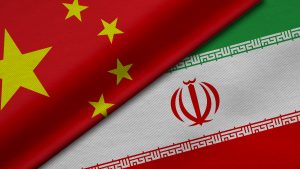Much has already been said about Hamas’s surprise attack in Israel last Saturday, October 7, and the results are still unfolding. The potential it carries to provoke drastic changes in regional – and possibly global – geopolitics is high and could have heavy impacts on the economy, security, and diplomatic relations of countries around the world.
Within this context, it is crucial to note the debut of a key player: China.
There is an important relationship between China and Hamas’ attack. First, it is important to remember that the financing and supply of weapons and strategies for Hamas come from Iran. Hamas, as well as Hezbollah and the Houthis (in Yemen) are financed by Tehran, as a way of launching an armed attack against its main enemy, Israel, even if Iran’s government formally keeps its distance.
At the same time, it is important to note that Iran’s ability to finance Hamas and Hezbollah fluctuates depending on its economic situation. That’s exactly where China comes in.
Despite its longstanding territorial ambitions in areas adjacent to its national territory, China only recently stepped onto gained significant geopolitical influence under current President Xi Jinping. That inexperience left China relatively naive in the field of global geopolitics and unfamiliar with the historical nuances of and between countries far from its neighborhood. China has been compensating for the lack of in-depth knowledge with robust financing and commercial strength. Trade and investment ties, and flexibility in credit lines, accelerated China’s entry into the ranks of influential powers overseas. However, given China’s historical context, this economic influence has not necessarily translated into concrete political and geopolitical influence.
Tehran saw in China an opportunity to reshape its foreign trade, as the Western market has been closed to Iran for decades. China has offered Iran generous lines of credit that are paid through exports of barrels of oil at below market prices. This revitalization of Iranian coffers, however, is not enough. The country faces very serious economic problems, even though China is close by to ease the burden when necessary.
Regardless of the economic malaise, Ayatollah Khamenei’s regime treats funding for Hamas and Hezbollah as a priority. China failed to identify that an important portion of its credit lines to Iran went toward financing fighters in Gaza and Lebanon.
Why would China care about Iranian funding of Hamas and Hezbollah? Well, it’s no secret that China seeks to establish a peaceful (and dependent) relationship with as many countries as possible, including Iran, Saudi Arabia, Israel, and Lebanon, among others. The destabilization of West Asia (through war or other crises) does not help Chinese objectives in the region.
In a recent notable effort, China helped promote a rapprochement between Iran and Saudi Arabia. However, this was not enough to stimulate an environment of political stability in the region, including putting a stop to Iran’s exploitation of armed proxy groups. From now on, China has a clear problem.
First, China’s Foreign Ministry has confirmed that three Chinese citizens were killed in Israel and two others are missing. Some reports have suggested that Chinese citizens were kidnapped by Hamas, although the ministry did not confirm this. If Chinese nationals are being held hostage, these will certainly be among the first to be released, as a call from Beijing to Tehran and from Tehran to Gaza should do the trick.
Second, while Iran celebrates the attack and Israel unleashes its built-up hatred toward Hamas, annihilating it in the process, it is up to China to act as a pacifying force in relation to Iran. If the United States decides to try to ease Israeli anger against Iran, the same needs to be done by China.
In a classic Cold War scenario, the chess pieces between Iran and China will need to navigate a dangerous landscape. An Israeli attack on Iran could trigger a widespread war in the region, and China is the only country with direct access to Tehran and a legitimate ability to influence the country’s decisions.
If China chooses not to act – which is always possible as Xi Jinping finds himself in the middle of a new witch hunt against high-ranking military personnel – it will become clear that China knows how to play a game in times of peace, but not in times of war. In this context, it’s telling that China has backed off its previous high-profile proclamations of an intention to mediate between Israel and Palestine, instead foisting that responsibility off on “the international community.”
Amid rising tensions in West Asia, China’s action or inaction will reveal its hand to its rival, the United States.

































